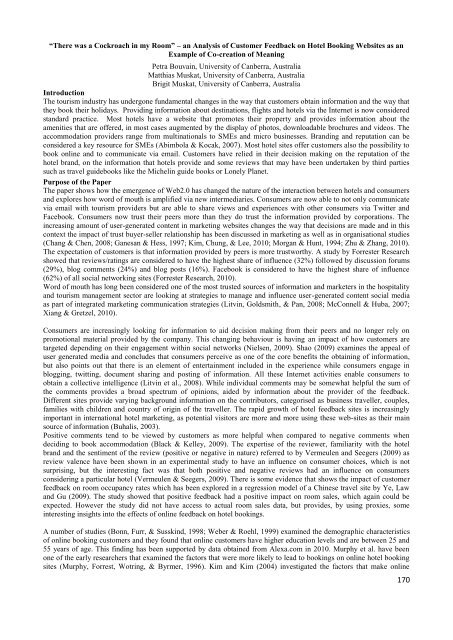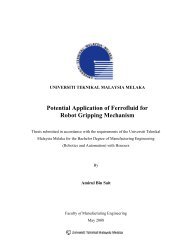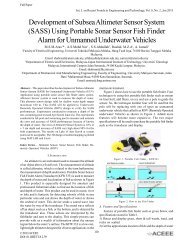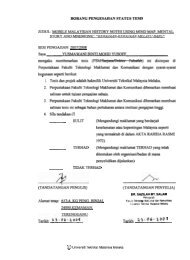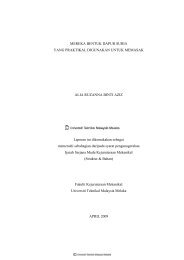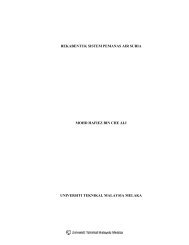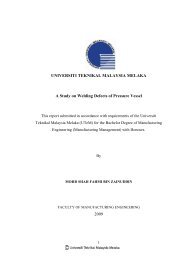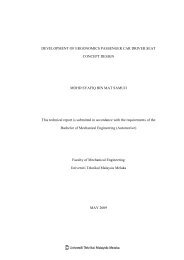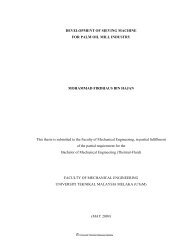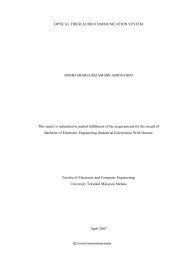Brand, Identity and Reputation: Exploring, Creating New Realities ...
Brand, Identity and Reputation: Exploring, Creating New Realities ...
Brand, Identity and Reputation: Exploring, Creating New Realities ...
You also want an ePaper? Increase the reach of your titles
YUMPU automatically turns print PDFs into web optimized ePapers that Google loves.
―There was a Cockroach in my Room‖ – an Analysis of Customer Feedback on Hotel Booking Websites as an<br />
Example of Co-creation of Meaning<br />
Petra Bouvain, University of Canberra, Australia<br />
Matthias Muskat, University of Canberra, Australia<br />
Brigit Muskat, University of Canberra, Australia<br />
Introduction<br />
The tourism industry has undergone fundamental changes in the way that customers obtain information <strong>and</strong> the way that<br />
they book their holidays. Providing information about destinations, flights <strong>and</strong> hotels via the Internet is now considered<br />
st<strong>and</strong>ard practice. Most hotels have a website that promotes their property <strong>and</strong> provides information about the<br />
amenities that are offered, in most cases augmented by the display of photos, downloadable brochures <strong>and</strong> videos. The<br />
accommodation providers range from multinationals to SMEs <strong>and</strong> micro businesses. <strong>Br<strong>and</strong></strong>ing <strong>and</strong> reputation can be<br />
considered a key resource for SMEs (Abimbola & Kocak, 2007). Most hotel sites offer customers also the possibility to<br />
book online <strong>and</strong> to communicate via email. Customers have relied in their decision making on the reputation of the<br />
hotel br<strong>and</strong>, on the information that hotels provide <strong>and</strong> some reviews that may have been undertaken by third parties<br />
such as travel guidebooks like the Michelin guide books or Lonely Planet.<br />
Purpose of the Paper<br />
The paper shows how the emergence of Web2.0 has changed the nature of the interaction between hotels <strong>and</strong> consumers<br />
<strong>and</strong> explores how word of mouth is amplified via new intermediaries. Consumers are now able to not only communicate<br />
via email with tourism providers but are able to share views <strong>and</strong> experiences with other consumers via Twitter <strong>and</strong><br />
Facebook. Consumers now trust their peers more than they do trust the information provided by corporations. The<br />
increasing amount of user-generated content in marketing websites changes the way that decisions are made <strong>and</strong> in this<br />
context the impact of trust buyer-seller relationship has been discussed in marketing as well as in organisational studies<br />
(Chang & Chen, 2008; Ganesan & Hess, 1997; Kim, Chung, & Lee, 2010; Morgan & Hunt, 1994; Zhu & Zhang, 2010).<br />
The expectation of customers is that information provided by peers is more trustworthy. A study by Forrester Research<br />
showed that reviews/ratings are considered to have the highest share of influence (32%) followed by discussion forums<br />
(29%), blog comments (24%) <strong>and</strong> blog posts (16%). Facebook is considered to have the highest share of influence<br />
(62%) of all social networking sites (Forrester Research, 2010).<br />
Word of mouth has long been considered one of the most trusted sources of information <strong>and</strong> marketers in the hospitality<br />
<strong>and</strong> tourism management sector are looking at strategies to manage <strong>and</strong> influence user-generated content social media<br />
as part of integrated marketing communication strategies (Litvin, Goldsmith, & Pan, 2008; McConnell & Huba, 2007;<br />
Xiang & Gretzel, 2010).<br />
Consumers are increasingly looking for information to aid decision making from their peers <strong>and</strong> no longer rely on<br />
promotional material provided by the company. This changing behaviour is having an impact of how customers are<br />
targeted depending on their engagement within social networks (Nielsen, 2009). Shao (2009) examines the appeal of<br />
user generated media <strong>and</strong> concludes that consumers perceive as one of the core benefits the obtaining of information,<br />
but also points out that there is an element of entertainment included in the experience while consumers engage in<br />
blogging, twitting, document sharing <strong>and</strong> posting of information. All these Internet activities enable consumers to<br />
obtain a collective intelligence (Litvin et al., 2008). While individual comments may be somewhat helpful the sum of<br />
the comments provides a broad spectrum of opinions, aided by information about the provider of the feedback.<br />
Different sites provide varying background information on the contributors, categorised as business traveller, couples,<br />
families with children <strong>and</strong> country of origin of the traveller. The rapid growth of hotel feedback sites is increasingly<br />
important in international hotel marketing, as potential visitors are more <strong>and</strong> more using these web-sites as their main<br />
source of information (Buhalis, 2003).<br />
Positive comments tend to be viewed by customers as more helpful when compared to negative comments when<br />
deciding to book accommodation (Black & Kelley, 2009). The expertise of the reviewer, familiarity with the hotel<br />
br<strong>and</strong> <strong>and</strong> the sentiment of the review (positive or negative in nature) referred to by Vermeulen <strong>and</strong> Seegers (2009) as<br />
review valence have been shown in an experimental study to have an influence on consumer choices, which is not<br />
surprising, but the interesting fact was that both positive <strong>and</strong> negative reviews had an influence on consumers<br />
considering a particular hotel (Vermeulen & Seegers, 2009). There is some evidence that shows the impact of customer<br />
feedback on room occupancy rates which has been explored in a regression model of a Chinese travel site by Ye, Law<br />
<strong>and</strong> Gu (2009). The study showed that positive feedback had a positive impact on room sales, which again could be<br />
expected. However the study did not have access to actual room sales data, but provides, by using proxies, some<br />
interesting insights into the effects of online feedback on hotel bookings.<br />
A number of studies (Bonn, Furr, & Susskind, 1998; Weber & Roehl, 1999) examined the demographic characteristics<br />
of online booking customers <strong>and</strong> they found that online customers have higher education levels <strong>and</strong> are between 25 <strong>and</strong><br />
55 years of age. This finding has been supported by data obtained from Alexa.com in 2010. Murphy et al. have been<br />
one of the early researchers that examined the factors that were more likely to lead to bookings on online hotel booking<br />
sites (Murphy, Forrest, Wotring, & Byrmer, 1996). Kim <strong>and</strong> Kim (2004) investigated the factors that make online<br />
170


